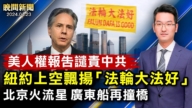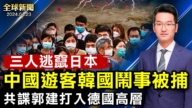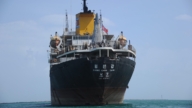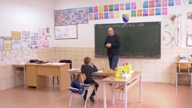【新唐人2011年8月8日訊】中國大陸的稀土污染極爲嚴重,中共當局卻出資支持三名稀土及輻射防護「專家」到馬來西亞主講三場「認識稀土說明會」,結果被馬國民眾砲轟抨擊,尷尬收場。
8月3號至5號,馬來西亞關丹州「海南會館」、「客家公會」和「籃球公會」分別主辦了三場「認識稀土說明會」。三名來自中國的主講專家不斷在會上強調,稀土廢料輻射值安全,不會造成急性放射病,公眾提出關於輻射污染可能引發的細胞病變及癌症風險問題,卻不能獲得合理解答,專家慘遭出席者當面「嗆聲」。
當地媒體報導說,「拯救大馬委員會」副主席潘家耀當場以醫生身份,質問專家之一夏益華是否擁有醫學背景,因為在醫學觀點上,沒有任何內部輻射被認為是安全的。他也對專家引用的數據存疑,認為數據沒有醫學根據,潘家耀揚言可以另尋醫學數據與對方辯論。
此外,「海南會館青年團」秘書方宗良,質問專家之一的趙亞民:是否有博士學位和化學工程背景,對方坦承沒有博士學位,卻拒絕回答是否擁有化工背景。
聯辦單位之一的「關丹客家公會」會長在第二晚離場時,遭到約50名反稀土民眾在酒店門外包圍抗議。主辦單位在最後一場堅持憑票入場,嚴格過濾出席者。
根據《南洋商報》透露,主辦單位只須負責專家住宿及津貼,其餘費用由中共當局承擔。
據了解,澳洲稀土巨頭萊納斯(Lynas),2008年獲得許可證,在馬來西亞彭亨關丹格賓工業區興建一座全世界最大的稀土提煉廠,引來強力反對,主要是擔心稀土廢料輻射影響健康。不過,工程即將竣工。這是近三十年來,中國以外首間稀土提煉廠,將在今年九月投入運作。
馬國民間對中共「專家」的抨擊延燒到了「臉書」(Facebook),主辦説明會的三個團體也遭殃。有網民質問:「如果有心探討稀土廠的利與弊,為何不探討講座內容?那講師根本沒有誠意講解稀土廠對人類健康帶來的危機呀?一味講安全,要不就講不確定。」
耐人尋味的是,中國大陸的稀土污染極端嚴重,有甚麽資格來告訴馬來西亞的民眾稀土污染不是問題?
長期致力於稀土研究的專家、中國稀土學會學術部主任陳佔恆指出,稀土開採首先要注重生態環境,但是中國的環保部門受地方政府部門制約,為了稅收保護企業。
陳佔恆:「大陸30多年工業化進程的太快,地方都為了發展經濟,增加稅收,促進就業,但把環境問題視而不見。還有一個放射性污染問題,應該相當大的重視才行,包頭(市)就沒有去治理,最近有報導癌症去世的。」
據報導,內蒙古包頭市盛産稀土,「包鋼」的排污加上稀土尾礦湖的污染,使得鄰近幾個村莊癌症患者激增。因為政府的補償金太少,遷居後生活失去保障,污染最嚴重的5個村莊的村民拒絕搬遷。
在馬來西亞的説明會上,出席民眾也詢問了包頭市的情況,但三名聲稱來自內蒙古的專家卻含糊帶過。
而商務部對外貿易司工業品處處長晁寧表示,中國並非世界上唯一擁有稀土的國家,卻在過去幾十年承擔了供應世界大多數稀土的角色,結果付出了破壞自身天然環境與消耗自身資源的代價。
據了解,稀土裏含有鈾和釷,焙燒過程中會生成焦硫酸土,按照規定,這些物質必須放到國家的放射性渣庫中,企業需要爲此付出每噸300元的使用費。很多中國企業不願意花這部分的錢,就把焦硫酸土到處亂放。
在大陸,稀土尾礦堆積如山。大陸沒有一家企業回收釷,過去幾年誰回收,誰虧損。據專家指出,國營的稀土企業的回收率大約60%,個體企業的囘收少於40%,而在外國稀土回收率通常能達到80%。
新唐人記者吳惟、蕭宇綜合報導。
Rare Earth Experts Embarrassed in Malaysia
Rare earth pollution is very severe in mainland China.
The Chinese Communist Party (CCP) sponsored a trip
for three rare earth and radiation prevention experts to
to host three Rare Earth Cognition Briefings in Malaysia.
After being bombarded with questions by Malaysian people,
the three “experts” left the meeting totally embarrassed.
From August 3 to 5, three Rare Earth Cognition Briefings
were held in Kuantan, Malaysia, at the Thean Hou Temple.
The three Chinese experts constantly emphasized that
the radiation emitted by rare earth waste products
is within the normal range and
it cannot cause acute radiation sickness.
The public questioned their findings
with regards to the risk of cell mutation and cancer.
Unscientific answers were provided by the Chinese “experts”
thus putting them on the hot seat.
Local media reported that the Save Malaysia Committee
V.P. Dr. Pan questioned one Chinese experts, Xia Yihua,
whether he had a medical background.
Because from a medical point of view,
internal radiation has never been considered safe.
Dr. Pan was suspect of the Chinese experts’ data,
saying that no medical evidence existed to support their claims.
Pan called for a future debate with more detailed medical data.
Youth Section of Hainan Association secretary, Fang,
questioned one of the Chinese experts, Zhao Yamin,
whether he has a Ph.D. or chemistry engineering background.
Zhao admitted that he does not have a Ph.D. degree but
refused to say whether he had such a background.
One of the organizers for the event, the president of the
Kuantan Hakka Association, was surrounded by
50 anti-rare-earth protestors outside the hotel.
Event organizers strictly controlled access to the last briefing.
Nanyang Siang Pau revealed that the event organizers
only subsidized the lodging and travelling expenses
for the Chinese experts, as the rest was paid by the CCP.
Australian rare earth giant, Lynas, obtained a permit in 2008
to build the world’s largest rare earth refinery in Pahang,
Malaysia, in Gebeng Industrial Zone.
The project was strongly opposed due the public’s concerns
about radiation from rare earth waste,
However, the project is nearly completed
and will start operations in September.
Malaysians now criticize the CCP “experts” on Facebook.
The three organizers were also criticized.
Some netizens questioned, “If you want to discuss
the pro and cons of rare earth refineries,
why not talk about the briefings’ contents?
The presenters didn’t even want to talk about the risks
that the refinery would have on people’s health.
They only talk about safety issues,
or they were uncertain about things.”
“Rare earth pollution in mainland China is at an all-time high.
What right do they have to tell Malaysians
that rare earth pollution is not a problem?”
Rare earth expert, Dr. Chen Zhanheng from the
Academic Department of the Chinese Society of Rare Earths,
directly pointed out that
rare earth mining needs to focus on the environment.
But China’s environmental protection agency
is under the constraints of the local government,
which protects the corporations for their tax revenues.
Dr. Chen said, “Mainland China went through
rapid industrialization over the past 30 years,
with local governments ignoring environmental problems.
Only focusing on economic development, increasing taxes,
and promoting employment, will not work.
Radiation pollution needs much more attention from the CCP.
People are dying from radiation-induced cancer in Baotou.”
Baotou, in Inner Mongolia, is rich in rare earth deposits,
thus rare earth pollution.
This has caused a hike in cancer patients in surrounding towns.
And because the government provides minimal
medical compensation and no relocation compensation,
villagers from five villages refuse to move,
in order to not lose their living hood.
In the Malaysia briefing, an audience member asked
the three Chinese experts about
the environmental impact rare earth mining
has had on Baotou City.
The three experts, who claimed to be from Inner Mongolia,
provided very vague answers.
Director Chao Ning of the Ministry of Commerce’s
Foreign Trade Division said that
China is not the only country that has rare earth.
However, over the past 10 years, China has become
the world’s main exporter of rare earths,
at the cost of destroying the environment and
depleting its own natural resources.
Rare earth contains uranium, and thorium and
the refining process produces sulphuric acid as a by-product.
According to the law, these by-products must be stored
in a radioactive waste storehouse.
Corporation need to pay 300 RMB (US$45.00) per ton
to store these wastes.
Many Chinese corporations irresponsibly dispose
of the radioactive waste, in order to avoid the extra cost.
There is no corporation in China that recycles thorium,
as they would lose money by doing so.
Experts pointed out that state-owned rare earth corporations
recycle over 60 percent of the rare earths they produce,
while private companies recycle less than 40 percent
and foreign companies recycle about 80 percent.
NTD reporters Wu Wei and Xiao Yu




























